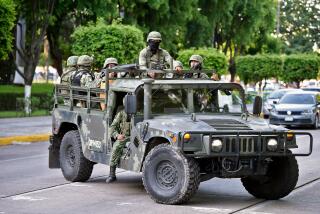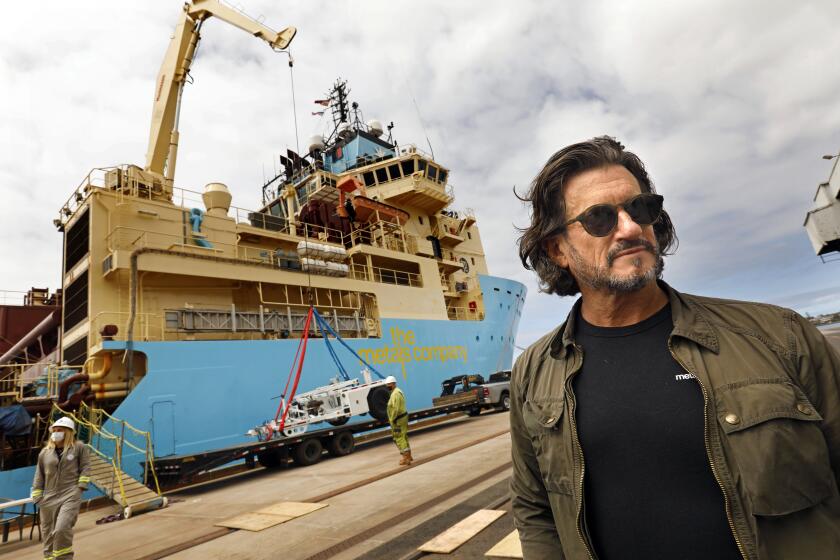U.S. Wants Iraqi Arms Destroyed : Persian Gulf: Disposal of all chemical, biological, nuclear weapons and missiles is demanded in proposed U.N. resolution. Reparations are also sought.
The United States is demanding that Iraq destroy all its chemical, biological and nuclear materials and all its missiles and launchers as the key provision of a resolution ending the Persian Gulf War submitted Thursday to members of the U.N. Security Council.
The Bush Administration proposed that Iraqi President Saddam Hussein be given a deadline of 15 days after the resolution’s passage to disclose to the United Nations the location and inventory of Iraq’s weapons and to agree to immediate on-site inspection.
A special commission would be formed within 45 days to scrutinize Hussein’s nuclear, biological, chemical and ballistic-missile capabilities and to start disposing of the weapons of mass destruction.
The commission also would be entrusted with the task of dismantling all materials and equipment in Iraq that could be used to manufacture nuclear bombs.
To ensure that the Iraqi dictator does not secretly import weapons, strict sanctions would remain in place, and the special commission would conduct regular monitoring inside Iraq.
The permanent cease-fire would take effect “upon formal Iraqi acceptance” of the resolution’s complex provisions, the document states.
In a related matter, the Security Council’s Sanctions Committee is expected at its meeting today to authorize large shipments of food to Iraq, after Western diplomats disclosed Thursday that the Baghdad government has agreed to allow the United Nations to distribute the food.
Diplomats at the United Nations said Thursday that the U.S. draft proposals for the cease-fire terms could undergo substantial revisions in the days ahead, but they constitute the core of the Bush Administration’s plans to ensure that Iraq does not once again threaten its Mideast neighbors.
The complex, 11-page American working paper, now being studied and amended in capitals around the world, calls for Iraq to accept its disputed 1963 boundary with Kuwait and for a U.N. observer force to police the boundary between the two nations.
It establishes a commission to administer a fund drawn from a percentage of Iraq’s oil exports to pay compensation claims against the Baghdad government by other nations, individuals and corporations. Such claims could include environmental damage, the theft of property and compensation paid to people whose relatives were killed by Hussein’s soldiers.
The extreme seriousness of Iraq’s food shortage was outlined Thursday by U.N. officials. But Western diplomats said the expected approval of food shipments is contingent on Iraq allowing U.N. and Red Cross workers to ensure that the food is sent to all parts of the country, including areas in the north and south where rebellions against Hussein’s rule are under way.
“We must be careful this is not food to feed the Republican Guards,” said a Western diplomat familiar with the Sanctions Committee’s plans, referring to the Iraqi troops considered most loyal to Hussein.
The proposed resolution lifts sanctions against the sale of foodstuffs to Iraq and some prohibitions against financial transactions. The sanctions, imposed by the Security Council in response to Iraq’s Aug. 2 invasion of Kuwait, did not restrict the movement of medical supplies.
Further underscoring the bleak situation in Iraq, U.N. Secretary General Javier Perez de Cuellar on Thursday relayed to the Security Council a grim report by a senior U.N. diplomat who returned from Iraq this week.
“The recent conflict has wrought near-apocalyptic results upon the economic infrastructure of what had been, until January, 1991, a rather urbanized and mechanized society,” wrote Martti Ahtisaari, the U.N. undersecretary general for administration and management.
“Now, most means of modern life support have been destroyed or rendered tenuous,” Ahtisaari’s report said. “Iraq has, for some time to come, been relegated to a pre-industrial age.”
The report called upon nations to help Iraq restore its agricultural, sanitation and health facilities.
“It is unmistakable that the Iraqi people may soon face a further imminent catastrophe, which could include epidemic and famine, if massive life-supporting needs are not rapidly met,” the U.N. observer said.
Ahtisaari said the flow of food through the private sector “has been reduced to a trickle.” Most power plants have been destroyed, he added. Telephone service is nonexistent, heaps of garbage are spread in urban areas, no surveillance capacity exists for communicable diseases, 9,000 homes were destroyed during the war, sewage cannot be pumped away or cleaned, crops cannot be irrigated and water cannot be purified.
“Nothing that we had seen or read had quite prepared us for the particular form of devastation which has now befallen the country,” Ahtisaari added.
The United States wants the Security Council to pass its draft resolution next week, and U.S. Ambassador Thomas R. Pickering has held several meetings with representatives of the four other permanent members of the Security Council.
But it was understood Thursday that the draft was already undergoing some revisions, and diplomats at the United Nations said the sheer size and complexity of the U.S. plan could preclude its passage as early as the Bush Administration desires.
Among other provisions, the resolution would prohibit Iraq from importing arms or any related materials and forbids other nations to send military personnel to Baghdad to train soldiers or to help design weapons systems.
The U.S. document designed to formally end the Persian Gulf War contains a timetable for both Iraq and the U.N. secretary general to follow. The day the Security Council passes its cease-fire resolution, sanctions against Iraq would no longer apply to foodstuffs.
On the second day, Perez de Cuellar would begin consultations with Iraq and Kuwait on the boundary between the two nations. The secretary general also would begin preparations for the U.N. observer force.
Planning for the peacekeeping force has been under way at U.N. headquarters for several months, and a host of nations have been asked about contributing troops. Once the observers are in place, they would inform the council of any serious violations of the border and any potential threats to peace.
By no later than the 15th day after the resolution’s passage, Iraq would be required to agree to immediate on-site inspection of its weapons of mass destruction.
The special inspections commission would not only depend on Iraq for the location of its weapons stockpiles and nuclear materials. The commission would have the power to add additional locations to its inspection list--presumably based on intelligence reports gathered by allied forces during the war.
The commission would have the power not only to supervise the destruction of weapons systems but to take custody of the arms.
The proposed resolution also requires that Iraq “unconditionally undertake not to develop or construct or acquire” any new weapons with mass destructive capability.
More to Read
Sign up for Essential California
The most important California stories and recommendations in your inbox every morning.
You may occasionally receive promotional content from the Los Angeles Times.





